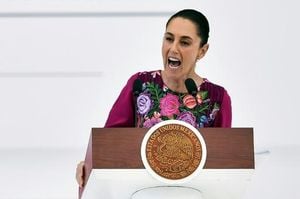Etihad Rail has announced the launch of a groundbreaking high-speed passenger train service connecting Abu Dhabi and Dubai, drastically reducing travel time to just 30 minutes. This ambitious project, set to operate at speeds of up to 350 km/h, aims to revolutionize transportation between the two UAE emirates.
The official announcement was made at the Al Faya Depot, with significant figures such as Sheikh Mohamed bin Zayed Al Nahyan, the President of the UAE, and other dignitaries, including Sheikh Khaled bin Mohamed bin Zayed Al Nahyan and Sheikh Hamdan bin Mohammed bin Rashid Al Maktoum, present to witness the event. According to the Abu Dhabi Media Office, this initiative is not just focused on travel; it is expected to contribute approximately Dh145 billion (around $39.5 billion) to the UAE’s GDP over the next five decades.
The high-speed train will facilitate seamless connections between Abu Dhabi and Dubai, making it especially convenient for residents and tourists alike. The project will not only benefit daily commuters but also boost tourism by connecting key destinations and attractions along the route.
Although the exact date for the service's commencement is yet to be announced, its introduction will mark significant progress from the previous Etihad Rail passenger service, which operates at 200 km/h. The upcoming high-speed service will establish enhanced connectivity, with trains expected to pass through strategically important locations.
Sheikh Khaled emphasized the importance of this project, stating, "It reflects our leadership’s vision to advance national infrastructure and improve transportation services to the highest international standards." This commitment aims to bolster the economy and improve the quality of life for citizens and residents, offering them quicker, more efficient transportation.
Alongside the high-speed project, plans include developing four strategic passenger stations located in Abu Dhabi, Dubai, Sharjah, and Fujairah. These stations will integrate seamlessly with metro and bus lines, creating a comprehensive transport network. Designed with contemporary and Emirati-influenced architecture, the stations will feature various amenities including business lounges, retail spaces, and family-friendly facilities.
Sheikh Hamdan, Crown Prince of Dubai, echoed similar sentiments and praised the project for its transformative potential. He noted, “This high-speed line not only reflects our innovative approach but also significantly enhances our regional connectivity.” The leaders are hopeful the project will place the UAE at the forefront of global transport innovation, allowing the nation to stand as a model for future transport developments.
During the ceremony, there was also discussion about the existing passenger train fleet, which is preparing to begin services at 200 km/h. This fleet and the high-speed service are intended to complement each other, ensuring extensive coverage across the UAE's urban and regional areas. By improving public transport options, the country aims to reduce reliance on road traffic, aiding sustainable urban development.
Success for this ambitious plan hinges on timely project execution and public readiness to transition to rail-based transportation. Tenders for construction contracts have already been issued, and network designs have received preliminary approvals, marking significant steps forward.
The expected high-speed train will not only make travel between Abu Dhabi and Dubai more manageable but also catalyze socio-economic development by enhancing tourism and fostering economic growth. It has become evident from recent developments and statements from UAE leaders, including Sheikh Khaled, demonstrating their initiative to meet the aspirations of future generations.
Finally, the response from the public and stakeholders will be integral as the Etihad Rail partnership continues to shape the future of transport within the UAE. Residents eagerly await the operationalization of this game-changing rail link, with high expectations of what it will bring to their everyday lives.



